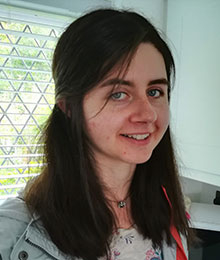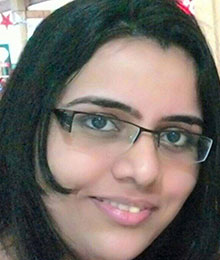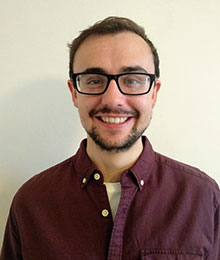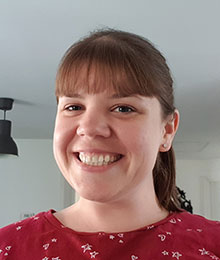'Most promising science’ prizes at Annual Conference 2021: Microbial Genomics winners
Posted on July 2, 2021 by Microbiology Society
Over the week at Annual Conference Online 2021, delegates showcased excellent posters and exciting research and we are very pleased to announce the winners of the Microbiology Society Journals ‘Most Promising Science’ prizes. In this blog, we will find out more about some of the winners awarded the prize by Microbial Genomics Editors.
David Forrest: ‘No non-sense: Preventing non-specific transcription in Bacillus subtilis’
Who or what inspired you to be a scientist?
I’d say my A-level biology teacher. She threw us in at the deep end with molecular biology and the organelles of the cell. I’ve been interested in transcription ever since!
What are you currently working on and what area of your research excites you the most?
I’m currently looking at Bacillus subtilis and how, despite having an increased genomic percentage of A and T nucleotides enriched for potential promoters, it doesn’t seem to have much non-specific transcription. Other than that, the new insights into transcription being gained from Cryo-EM are pretty neat and worth checking out.
How would you explain your poster to a child under 10?
Bacteria are like little bugs which are so small we can’t see them. They have something called DNA, which give instructions to the bacteria that tell them how to build themselves. Different bacteria read these instructions differently, and I’d like to know how and why.
What would you be doing in your career if you weren’t a scientist?
Possibly a forensic scientist. During school I thought that would be a cool job, I even spent a day in the lab thanks to a contact in the police force! Instead of analysing fingerprints, I’ve ended up analysing transcriptomic data.

Louise Flanagan: ‘How does regulatory evolution differ between related groups? Diverse, repeatable, and undiscovered routes to restore motility through mutations in gene regulatory networks in two immotile bacterial strains’
Who or what inspired you to be a scientist?
Probably Phillip Pullman's Dark Material's Trilogy. The books describe all these worlds with wildly different organisms who have adapted in unique ways- it made me realise how life can come in so many different forms and evolve in many different ways. I became pretty fascinated with this after that.
What are you currently working on and what area of your research excites you the most?
At the moment I'm looking at how the nutritional environment may influence what mutations bacteria accumulate to combat the loss of the regulator for their flagella.
How would you explain your poster to a child under 10?
Bacteria use tails to swim around to gather food. We look at bacteria that have lost their tails and try to see if they can start to swim again so they don’t go hungry! Different types of bacteria do this in different ways.
What would you be doing in your career if you weren’t a scientist?
This would be a bit of a pipe dream, but I would have liked to give art or writing a go.
Maria Rosa Domingo Sananes: ‘Seeing the (random) forests for the genes: a machine learning approach to pangenome structure analysis’
Who or what inspired you to be a scientist?
Initially, my parents, who are both computer scientists. My father was a physicist initially. They encouraged me to learn about science, among other things, from early on. Later, during my undergrad in Venezuela, many of my lecturers had a huge influence, through their commitment and enthusiasm for research, even in difficult circumstances.
What are you currently working on and what area of your research excites you the most?
I am trying to work on multiple things from bacterial genomics to regulatory networks in microbial eukaryotes. What excites me the most is trying to understand how and why complex cellular networks and systems originate and evolve, and whether we can predict what can happen next.
How would you explain your poster to a child under 10?
Some bacteria live in small buds in the roots of pea plants, helping the plant by providing nutrients. Bacteria on the buds of different plants can be different because they have different genes. We don’t know why, but we can find clues if we can guess when a particular gene is present.
What would you be doing in your career if you weren’t a scientist?
Probably an illustrator or architect, perhaps a musician, although I am not sure I would be very good at it!

Rama Bhatia: ‘Environment and the evolutionary trajectory of horizontal gene transfer’
Who or what inspired you to be a scientist?
Many things have inspired me. I guess it started with small experiments in school, reading about microbes, observing them under the microscope and then gradually building up to the point where I decided I wanted to contribute to our knowledge of microbes and hopefully make a small difference.
What are you currently working on and what area of your research excites you the most?
I am researching what factors (for example drug dosage, environment, protein interactions) can pose a barrier to horizontal gene transfer (HGT). Current knowledge provides an understanding of genes that have survived the evolutionary sieve but not of those that failed. It will be interesting to see if we can address this by systematic experimental evolution.
How would you explain your poster to a child under 10?
HGT is when bacteria from different families exchange pieces of their DNA (genes). This can be useful, harmful or have no effect on the recipient. I study how the outcome of this exchange is affected by the environment they live in and the number of copies of a gene transferred.
What would you be doing in your career if you weren’t a scientist?
It’s kind of hard to imagine myself not being a scientist because this is what I love doing. Having had teaching experience before joining my PhD, I guess I would be a teacher if not a scientist but would definitely be teaching
Samuel Greenrod: ‘Global diversity and potential functioning of prophages in plant pathogenic Ralstonia solanacearum bacterium’

Who or what inspired you to be a scientist?
My primary inspiration to be a scientist is the incredible complexity of life from the micro to the macro scale. Every exciting discovery always comes with the caveat that there are future questions to be answered and as a result, it never ceases to be interesting.
What are you currently working on and what area of your research excites you the most?
Currently, I’m doing a computational master’s project investigating integrated bacteriophages, termed prophages, in the destructive plant pathogenic bacterium Ralstonia solanacearum. I am particularly interested in the underlying evolutionary principles in this field, as, whilst maximising their own fitness, prophages also affect both bacterial evolution and microbe-host co-evolution.
How would you explain your poster to a child under 10?
I am investigating viruses that live inside the DNA of a disease-causing plant bacterium. In my poster, I demonstrated that these viruses are diverse and exist all over the world but are primarily found in distinct bacterial populations. Therefore, the viruses and bacteria may have had a long-term population-specific relationship.
What would you be doing in your career if you weren’t a scientist?
If I weren’t a scientist, I would pursue a career in medicine or law. I have always loved learning and problem-solving, both of which are well catered for in those professions, and I like the idea of using my knowledge to improve people’s lives.

Taegan Brown: ‘What is the effect of bacteriophage treatment on the gut microbiota?’
Who or what inspired you to be a scientist?
I have always been curious about the world around me. My interest was sparked in primary school, where we created things to solve problems and focused on looking after the environment. I just wanted to find out more about science. Along the way, I had great teachers who fostered my curiosity.
What are you currently working on and what area of your research excites you the most?
I currently work on bacteriophages which are viruses that target bacteria from the human gut. We use environmental samples like sewage to hunt for these viruses. There are so many diverse viruses, that we are often working with one that no one has seen before. It is exciting to uncover more about each bacteriophage!
How would you explain your poster to a child under 10?
There is a battle between good and bad bacteria happening in the gut. Sometimes the bad bacteria win and make us sick. One way to fight and kill bad bacteria is using bacteriophages. These are our enemies’ enemy! We did an experiment to see the battle between good and bad bacteria over time when the bacteriophages were present.
What would you be doing in your career if you weren’t a scientist?
If I was not a scientist, I would be a teacher or a podiatrist. I also enjoy science communication, but I get to do this as a scientist!

